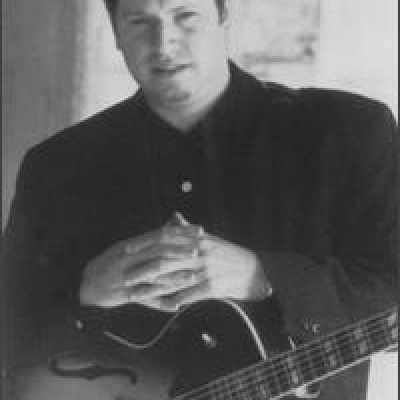
Dave Specter
by Bill DahlIn a relatively short time frame, Chicago guitarist Dave Specter has found his way onto the blues equivalent of the fast track. Just over a decade ago, the towering guitarist with the carefully coiffed hair first made his presence felt as a good-natured bouncer at B.L.U.E.S., a Windy City blues mecca. Now, he's got six acclaimed albums in the Delmark catalog, every one a satisfying, challenging mix of blues (Specter lists influences including T-Bone Walker, Pee Wee Crayton, Magic Sam, and Otis Rush) and jazz (Kenny Burrell's another of his main men). The native of Chicago's Northwest side didn't even grab a guitar until he was 18 years old, inspired by his harp-blowing older brother Howard. While working at Jazz Record Mart and in the shipping department at Delmark he took guitar lessons from Sunnyland Slim's former guitarist Steve Freund. Once he gained some skills, Freund set him up with legendary drummer Sam Lay and Howlin Wolf's guitar player Hubert Sumlin for a tour. At this time he was also working at B.L.U.E.S., making valuable contacts on the job that led to sideman gigs with Johnny Littlejohn, Son Seals, and the Legendary Blues Band before he assembled his own outfit, the Bluebirds, in 1989. Since Specter doesn't sing, he recruited deep-voiced crooner Barkin' Bill Smith as his first vocalist. The two shared the spotlight on Specter's alluring 1991 Delmark debut, Bluebird Blues. After Smith departed, Specter latched on to another West side veteran, Jesse Fortune, backing the singer on his 1993 Delmark set Fortune Tellin' Man. Dazzling harpist Tad Robinson took over frontman duties for the Bluebirds' 1994 disc Blueplicity and Live in Europe the next year. California harpman Lynwood Slim became the band's resident singer when Robinson left. Jazz is growing increasingly prominent in Specter's evolving guitar attack. He imported legendary jazz organist Brother Jack McDuff to provide a Hammond B-3 cushion for his 1996 Delmark project Left Turn on Blue. In 1998 he returned with a new singer, Lenny Lynn, and a new record for Delmark, Blues Spoken Here. For 2000s Speculatin' Spector did away with vocals and cut 13 instrumentals. Is What It Is appeared in 2004, followed by Live in Chicago (a DVD of the same show was also issued) in 2008, all on the Delmark imprint. Squeezing frequent European tours in between a myriad of local gigs, Specter wears his love for swinging blues tradition on his sleeve, and it fits him well.
